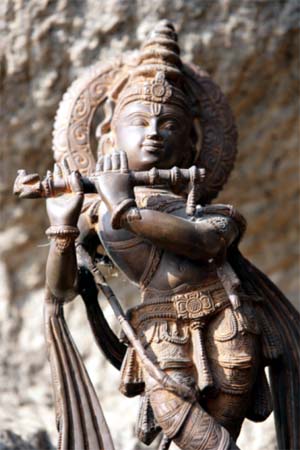Dec 22, 2025
Dec 22, 2025
Who is a Hindu?
 Swami Chinmayananda once said, (and I paraphrase), 'I am not interested in converting anyone into Hinduism. I am interested in converting Hindus into Hindu religion.' It rings true today as we have neglected the study of the religion of our ancestors that has survived thousands of years and has had the unique capacity to adapt and change with the times. The Hindu religion is aptly called 'Sanatana Dharma' which is synonymous with 'a religion with no beginning or ending, that will survive forever.'
Swami Chinmayananda once said, (and I paraphrase), 'I am not interested in converting anyone into Hinduism. I am interested in converting Hindus into Hindu religion.' It rings true today as we have neglected the study of the religion of our ancestors that has survived thousands of years and has had the unique capacity to adapt and change with the times. The Hindu religion is aptly called 'Sanatana Dharma' which is synonymous with 'a religion with no beginning or ending, that will survive forever.'
The fundamental question like what is Hinduism is difficult to answer in simple words and to justly convey the essence of the religion of Hinduism. A more detailed and organized study of the evolution and history of the religion is necessary to fully understand the tenets of the religion. But it need not be complicated or esoteric for a commoner to comprehend. The philosophy, so well explained in the Upanishads can be followed by anyone once the basic concept of the religion is understood.
Who is a Hindu? In simple terms, 'He who accepts the Scriptures (such as the Vedas, Smritis, Puranas and Tantras), as the basis of his religion and of the rule of conduct (or Dharma), and he who believes in one Supreme God (Brahman), in the Law of retributive justice (or Karma), and in reincarnation (punarjanma), is a Hindu.' To really understand this simple statement one has to know what the scriptures are and what are the laws that govern the life of a Hindu.
What is Hinduism?
It is important to recognize four important fundamental doctrines to fully understand Hinduism. These are derived from the philosophical Vedic texts of Upanishads.
Vedic religion as practiced for thousands of years has little resemblance to current day Hinduism. However the common binding thread is the acceptance of the Vedas as supreme scriptures in both variations of religion. Today much importance is given to the worship of a personal God (bhakti), whereas in yesteryears the main form of worship was sacrifice. Nevertheless, the ultimate goal of the sacrificial Vedic religion and the bhakti form of Hinduism, as practiced today, is the same. It is the aim of attaining salvation or moksha. (Buddhism calls it nirvana and Jainism, mukti). When the inner Self or Brahman in every soul is uncovered, it is called Self Realization or salvation. This act will release a soul from the burden of repeated births and deaths (punarjanma and punar-mrthyu).
As a consequence of being born as humans, everyone is caught in the endless and repeated cycle of birth and death. This is the Samsara that all humans have to endure. Liberation from this cycle of misery is the purpose of life for all Hindus. There are incentives to serve the rest of humanity well. Good deeds and bad deeds are counted, like a balance sheet. This law of retributive justice is called karma. Karma literally means deed or work. The cumulative effects of the deeds in this life has profound effects in the afterlife. Through karma the body of next life is acquired; and on previous karma depended a man's character, fortune, and social class and his happiness or sorrow. The body cannot escape the law of karma. However, by judgment and forethought one can utilize karma to his advantage. Human being has a free will that permits him to make intelligent choices, which in turn may alter the manifestation of karma. The ultimate goal of every Hindu is to reduce the bad karma that he may have to carry with him into his next cycle of birth. When enough good karma is accumulated over a number of lifetimes, the soul is liberated and attainment of salvation is at hand. Every human being has the potential to eventually attain salvation by his or her deeds and this fundamental right cannot be denied to anyone.
Paths to salvation are through three different means. Through the study of scriptures for the learned is called jnana yoga. A practitioner of Hinduism has other choices such as intense devotion to a personal God that he can utilize to attain salvation. This is referred to as bhakti yoga. The third method is through selfless service to humanity called the karma yoga, so well discussed in the Bhagavad-Gita. If an essence of God or Brahman is in every soul, then the service of humanity is the same as service of the Divine. Service without regard for the fruits of action is specially extolled. A commoner can practice the latter two means of attaining salvation, even if he is illiterate and unable to study the scriptures on his own.
Codes of conduct (dharma) are specifically enumerated in Manu Smriti. Four stations of life are
A Hindu is advised to contain and restrain all the emotions that may lead to a sinful existence. Thus he is asked to control such emotions as Kama (lust), Krodha(anger), Mada (ego, pride) and Matsara (jealousy). The moral codes of various texts repeatedly emphasize the importance of being aware of these ordinary but strong human emotions that lead to the disruptions of a harmonious society.
30-Jun-2002
More by : Dr. Neria H. Hebbar

|
very informative and very easy to understand |